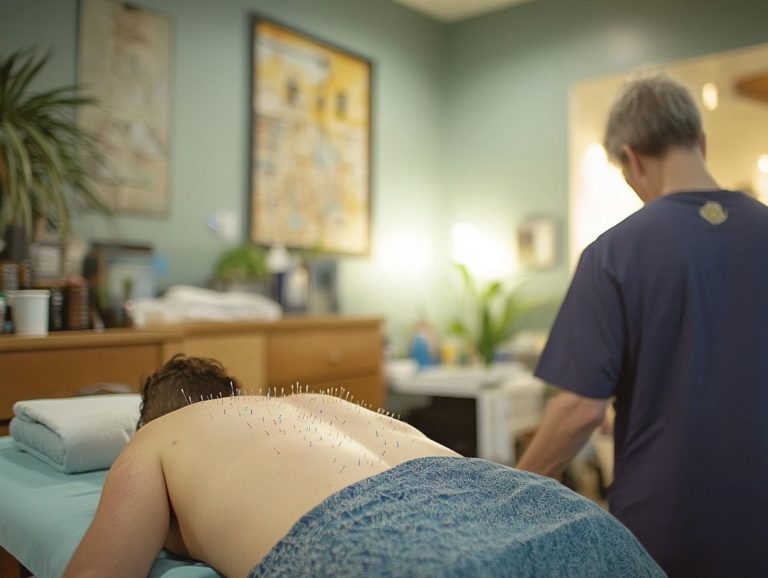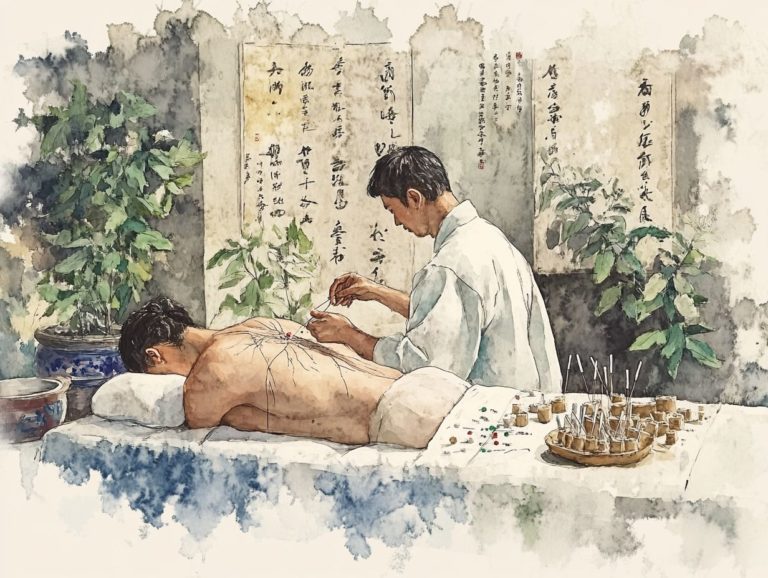The Effectiveness of Acupuncture in Treating PTSD
Post-Traumatic Stress Disorder (PTSD) affects millions. It often leaves you feeling trapped by your trauma.
While traditional treatments like therapy and medication are common, alternative methods such as acupuncture are gaining attention.
This exploration looks at PTSD and various treatment options, especially acupuncture. We will highlight its historical roots, principles, and promising research on its effectiveness.
Discover how acupuncture can ease your symptoms and enhance your healing journey through PTSD’s challenges.
Contents
Key Takeaways:

Acupuncture is a promising alternative treatment for PTSD. Studies show it can reduce symptoms and improve overall well-being.
The techniques of acupuncture help regulate your body s stress response and promote relaxation, benefiting PTSD patients.
When considering acupuncture, finding a qualified practitioner is crucial. Use it as a complement to traditional therapies.
Understanding PTSD and Current Treatment Options
PTSD is a serious condition that can arise from trauma. It can lead to mental health challenges like anxiety, depression, and emotional pain.
If you are a veteran, PTSD may affect you more deeply, causing chronic pain, sleep issues, and heightened alertness.
The DSM-5 states these symptoms can greatly impact your mental health. This underscores the urgent need for effective treatments that address both psychological and physical symptoms.
Defining PTSD and Common Treatment Approaches
PTSD, or Post-Traumatic Stress Disorder, emerges after experiencing or witnessing trauma. It includes symptoms like emotional distress and sleep disturbances.
Those struggling with PTSD may have vivid flashbacks, overwhelming dread, and a strong desire to avoid trauma reminders. This heaviness disrupts daily life and affects relationships.
Symptoms can vary in severity, often leading to isolation and hopelessness. Common treatments include cognitive behavioral therapy (CBT), which helps reframe negative thoughts and confront triggers.
Emotional processing is also vital for recovery. It helps you work through feelings and integrate traumatic experiences healthily.
The Basics of Acupuncture
Acupuncture is an ancient practice from Chinese medicine. It stimulates specific points on the body to promote healing and restore balance.
This technique aims to enhance the flow of Qi, or energy, in your body. Skilled acupuncturists use fine needles to improve health, relieve pain, and boost mental well-being.
Acupuncture is gaining recognition in modern healthcare, making it an attractive option for those seeking holistic wellness.
History, Principles, and Techniques

The history of acupuncture stretches back thousands of years as a cornerstone of traditional Chinese medicine. It harmonizes the body’s energy flow through specific techniques and practices.
Originating in ancient China, acupuncture has evolved into a rich tapestry of methods focused on restoring balance and well-being. At its core, this time-honored practice is based on the principles of Qi, or vital energy, flowing through pathways in the body.
Among the various techniques are fine needling, which stimulates healing points, and moxibustion, a method that involves burning mugwort to enhance energy flow.
Today, acupuncture is embraced within holistic treatment frameworks, working alongside modern medical strategies. It demonstrates therapeutic potential across many health challenges, proving its enduring relevance and effectiveness.
Research on Acupuncture for PTSD
Recent research into acupuncture has sparked interest regarding its effectiveness as a treatment for PTSD, especially among veterans facing unique challenges from trauma exposure.
Studies and Findings on Effectiveness
Various studies, including a notable 2024 study published in JAMA Psychiatry, have explored the effectiveness of acupuncture for treating PTSD. The results reveal promising potential as a complementary therapy.
This research focused on veterans with PTSD, showing significant reductions in symptoms like hyperarousal and emotional numbing after regular acupuncture sessions.
Participants experienced an impressive average decrease of 30% in PTSD symptom severity, as measured by established clinical scales. Other studies support these findings, highlighting that acupuncture not only alleviates symptoms but enhances overall well-being by fostering relaxation and improving sleep quality.
These insights show how acupuncture can be part of a comprehensive treatment plan for veterans, offering an accessible and effective means of managing mental health challenges.
How Acupuncture May Benefit PTSD Patients
Imagine the incredible benefits acupuncture can offer for those living with PTSD by addressing both the physiological and psychological aspects of the disorder.
Its remarkable influence on the nervous system and emotional processing can facilitate healing and foster a sense of well-being.
Proposed Mechanisms and Potential Benefits

The proposed mechanisms by which acupuncture may help PTSD patients include its ability to modulate the nervous system, enhance neurobiological processes related to fear extinction, and promote emotional resilience.
Studies suggest that acupuncture can stimulate specific points on the body, influencing the balance between the sympathetic and parasympathetic nervous systems the parts of the nervous system that control stress responses and relaxation, respectively. This balance is crucial for regulating stress responses and achieving tranquility.
By activating the parasympathetic system, acupuncture may help ease anxiety and hyperarousal symptoms associated with PTSD. The neurobiological interactions triggered by acupuncture can facilitate the release of neurotransmitters like endorphins and serotonin, which are vital for mood regulation and recovery.
Thus, this ancient practice might not only provide immediate relaxation but also foster long-term resilience as individuals navigate the aftermath of trauma.
Incorporating Acupuncture into PTSD Treatment
Incorporating acupuncture into PTSD treatment involves a nuanced understanding of best practices and seamless integration with other therapeutic methods. Treatment options should be tailored specifically to individual needs.
Explore how acupuncture can change your life!
Best Practices and Considerations
When incorporating acupuncture into your PTSD treatment plan, follow best practices. These include evaluating your patient history, understanding treatment options, and ensuring a holistic care approach.
This involves engaging with you to assess your unique experiences. Practitioners can then tailor treatments to meet your needs.
Creating a comfortable environment is crucial. You should feel safe sharing sensitive information.
Regular assessments, such as questionnaires or verbal feedback, can enhance your experience. Consistency in treatment frequency supports your progress.
By educating you on the benefits of acupuncture and how it integrates with other therapies, practitioners can empower you and encourage your commitment to the treatment plan.
Frequently Asked Questions
So, what is acupuncture? How does it actually work?

Acupuncture is a traditional Chinese medicine practice that involves inserting thin needles into specific points on the body to stimulate the flow of energy, often referred to as “Qi.” This practice is believed to help restore balance and promote healing.
Is acupuncture effective in treating PTSD?
There is growing evidence that acupuncture can be an effective treatment for PTSD. Several studies have shown that it can help reduce symptoms such as anxiety, depression, and sleep disturbances commonly associated with PTSD.
How does acupuncture help with PTSD?
Acupuncture has been found to stimulate the release of endorphins and other neurotransmitters in the body, which can help to reduce stress and promote relaxation. It also targets specific areas of the brain that are responsible for regulating emotions, which can be helpful in managing PTSD symptoms.
Are there any side effects of acupuncture for PTSD?
Acupuncture is generally considered safe when performed by a trained and licensed practitioner. The most common side effects include mild bruising or bleeding at the insertion site, and temporary soreness or discomfort.
Wondering how many acupuncture sessions you need?
The number of acupuncture sessions needed for treating PTSD may vary for each individual. However, research suggests that a minimum of 8-12 sessions may be needed to see significant improvements in symptoms. Your practitioner will work with you to develop a treatment plan based on your specific needs.
Is acupuncture a standalone treatment for PTSD?
No, acupuncture is not typically used as a standalone treatment for PTSD. It is often used in combination with other therapies such as counseling, medication, and lifestyle changes to provide a comprehensive approach to managing symptoms and promoting overall well-being.






